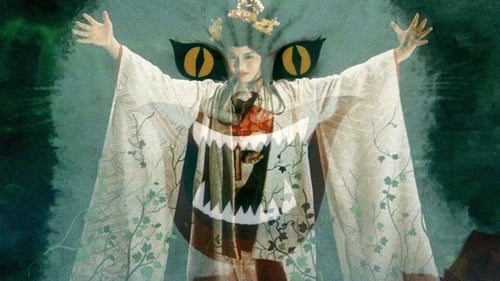Elements
Género :
Tiempo de ejecución : 2M
Director : Chris Gerrard
Sinopsis
A short experimental film.

Siete chicas de instituto ven sus vacaciones chafadas cuando su profesor (Kiyohiko Ozaki) tiene que cancelar el viaje que tenía planeado realizar con ellas. Las cosas marchan incluso algo peor para Oshare (Kimiko Ikegami), una de las chicas, ya que recientemente su padre le ha presentado su nueva madastra (Haruko Wanibuchi), lo que no le ha hecho demasiada gracia. Mirando un álbum de fotos, Oshare se encuentra con la foto de boda de su madre a quien se la ve acompañada de su hermana (Yoko Minamida) quien nunca llegó a casarse ya que su prometido murió en la guerra. Oshare se pone en contacto con su tía y ésta la invita a ella y a sus amigas a pasar las vacaciones en su mansión en el campo. Cuando el grupo de chicas se presentan en la mansión, allí las recibe la tía de Oshare en sillas de ruedas y medio ciega. Muy pronto las chicas descubren que la mansión tiene vida propia.

To produce speech, a set of mechanisms must be brought together. What is the normal articulation for speech? How to produce the sounds that make it up in the correct way? A physiological analysis of the aspects of speech shows us how: the jaw must move in a certain way; the air must be expelled from the lungs in another. Based on the concepts stated in the film "Normal Speech Articulation" (1965), produced by the University of Iowa (USA), we intend to reflect on the way women have been represented, and consequently educated, over the years, both in film and in the media. Largely composed of archival footage, this film intends to make evident, through a montage inspired by Structuralist movements, the violence of this education.

When he understood it was all a dream. He decided to stay until eternity, darker since you died.

“The lakes, their rounds palms, they drowned the face of the Sky:
I have turned the sphere to look at the Sky". Victor Segalen. Estelas

After a catastrophic global war, a young filmmaker awakens in the carnage and seeks refuge in the only other survivor: an eccentric, ideologically opposed figure of the United States military. Together, they brave the toxic landscape in search of safety... and answers.

A film about creation itself, a rite of the sun and the surfaces illuminated by it. Light capturing and light summoning "in a primitive attempt to catch the sun with my hands".

In 1999, 11-year-old Nisha Platzer lost her older brother, Josh, to suicide. Twenty years later, her search for a specialized medical treatment leads her to the door of someone who was once exceptionally close to Josh. And so it is that she finally has the chance to truly know her brother through his chosen family. Captured over five years in which synchronicities continually manifested, Platzer’s documentation of these encounters gently asserts that both grieving and healing are meant to be communal experiences.

A study of light and shadows, framing and composition with no clear narrative. A visual essay on silence and the passing of time.

Set in a nightmarish Bardo, a place between death and rebirth, a tormented writer faces down demons of his own making. Forced to confront the darkest moment in his life, he mines fractured and repressed memories for a way out. A woman is at the center of all the writer’s afterlife encounters. She is the subject of his life’s greatest regret, and she materializes everywhere in this Otherworld. The writer cannot detach any thoughts of his life from her.

The film is about the deceleration of motion in linear form and speed, establishing a connection between space and love. It ends with high-contrast photos with increasingly drastic color changes. This short film, inspired by Brakhage's Stellar film, was created by manipulating 1750 space photos in Photoshop along with grotesque paintings. Some frames contain black paintings by Francisco Goya, grotesque drawings by Leonardo da Vinci, grotesque engravings by William Blake. In order to refer to Brakhage's poetic style and understanding of storytelling in experimental cinema, two poems by Frank O'Hara and Kenneth Koch are placed in the beginning and end of the film.

A cine-essay about the ego death and consciousness rebirth.

Niño de Elche deja entreabierto el telón en los momentos previos al estreno de su espectáculo Coplas Mecánicas, con Israel Galván en Sónar Festival 2018.

An abstract, experimental film of a character observing a rainy night.

This is a simple test, with a small and personal motivation to improve the history of motion and time, in the mind of the filmmaker. Hanife released it on 1 July 2018 while he had started executive part from one week before it.

A photographer looks at pictures of the last day of a boy's life.









